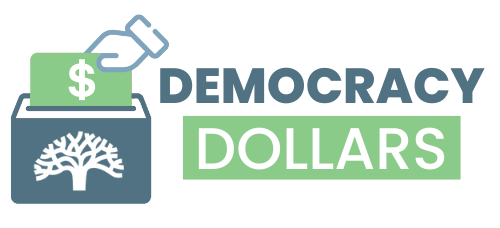
Frequently Asked Questions
-
Every eligible resident is mailed a certain amount, say $100, in vouchers that are funded through the city. Vouchers can only be donated to candidates running for local office. These candidates then redeem the vouchers for public campaign funds.
The Democracy Dollars program will promote open and honest elections in Oakland by ensuring that participating candidates take part in five public debates, requiring more transparency about who funds campaign ads, enacting new limits on lobbying so that city officials remain focused on the voice of the people, and placing a new cap on campaign contributions for candidates who use public funds.
-
Boost the power of small donors. A recent survey of likely 2022 Oakland voters found that many residents don’t donate to local campaigns because they simply can’t afford to. In Oakland’s 2014 and 2016 elections, 93% of contributions came from less than 1% of the city’s population.
Make our elections cleaner and more transparent so that candidates can focus on the voices of the people, not the pull of big money.
Allow community-backed candidates to run competitive campaigns without wealthy donors.
Create more diversity across race, gender, and income among donors and among candidates running for office.
-
Democracy dollars are a winning proposal. A recent survey of likely 2022 voters found that a majority of Oaklanders support expanding public financing for local elections. Enthusiasm for the Democracy Dollars program was high, with 72% support from likely voters. Support grows after Oakland voters review the details of the measure.
-
Through the creation of an Election Fund, paid for by added revenue generated from new ballot initiatives.
-
No. The program will be funded through Oakland’s general fund. We estimate that funding and administering the program will only require a fraction of a percent of Oakland’s general fund – less than half of one percent of the fund annually.
-
Yes. Oakland currently has a public financing program that provides qualifying City Council candidates with a limited reimbursement for their campaign expenses.
Qualifying candidates are eligible to receive a small amount of funds that is dependent on how many candidates are running for City Council, as well as the amount of monies allocated and budgeted to the program by City Council.
In 2020, there was $153,000 available to be distributed among eligible candidates. During most years, the amount available per candidate has been low, usually resulting in about $8,000 - $25,000 per candidate.
-
What does not work: The program is too small and not well funded.
In comparison to other public financing programs in the Bay Area (Berkeley and San Francisco) and across the nation (Los Angeles and New York), Oakland’s current program is small and not well funded. As a result, candidates cannot rely upon it as the primary source of contributions and funding.
To date, the program also had not reduced the pressure faced by candidates to fundraise, nor led to an increase in the number of candidates pursuing local office.
As of 2020, the program has not increased the number and power of small donors after it became a reimbursement program in 2010.
What does not work: Doesn’t curb big spending.
Candidates are not able to run an effective campaign on such a small amount.
Unfortunately, the current system requires candidates to raise a significant amount of money to pay for campaign costs such as campaign materials, signs, mailers, postage for mailings, campaign staff and consultants. As a result, campaigns seek out contributions from wealthy donors since those are the individuals who can afford to give money.
The program does not – and cannot – decrease the influence of large donors in local elections, due to the United States Supreme Court decision in Citizens United, which restricts government from limiting independent expenditures made by persons or committees not coordinating with a candidate.
What does not work: Doesn’t curb big money influence.
A Public Ethics Commission-initiated review of Oakland’s Limited Public Financing (LPF) program conducted in coordination with the UC Berkeley Goldman School of Public Policy in 2013 concluded that, as of that time, the LPF program had not reduced the influence of large contributors in local elections.
What does not work: Vulnerable to defunding.
Because the funding for the program is not a set amount prescribed by law, and is instead funded through a subjective budget set aside made by the City Council, it is vulnerable to defunding during lean years or it can be a tool for political retribution.
What does work: Increases competitiveness of campaigns.
The program has resulted in more competitive races – both in the number of contested races and incumbent margin of victory – and led to non-incumbent candidates who received public funds performing better across the board than non-incumbent candidates who did not receive public funds.
